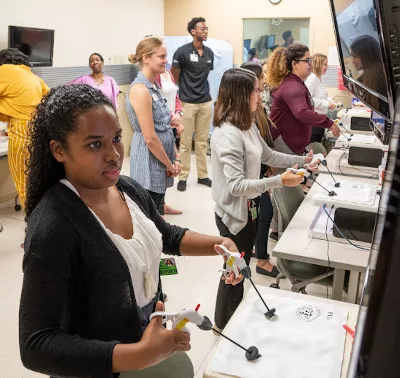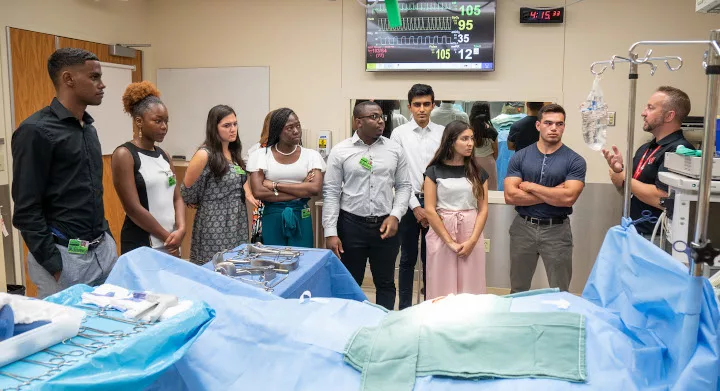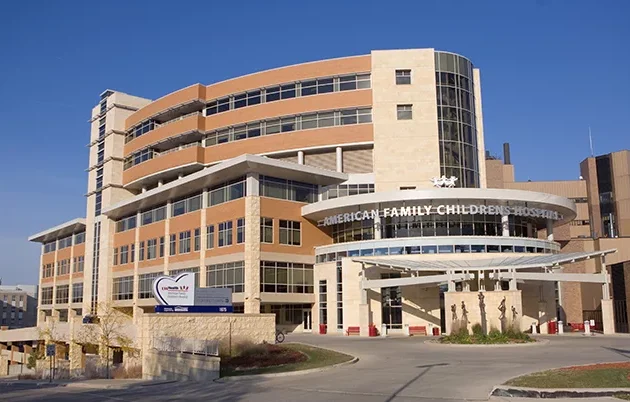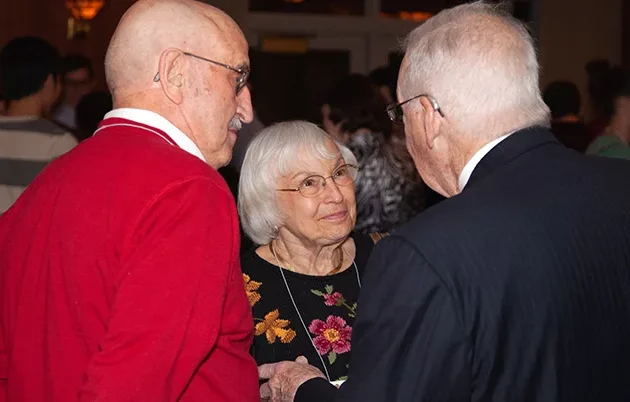The HPSP is among several programs that the SMPH supports to boost the number of under-represented minorities in health care professions. Some engage students at the elementary, middle and high school levels, such as The Ladder (see Quarterly, Volume 21, Number 1, 2019), while others, including the HPSP, are designed to foster interest among undergraduate students.
As another example, the prominent and longstanding Rural and Urban Scholars in Community Health (RUSCH) Program was developed for undergraduate learners in 2009; it’s a partnership among UW System campuses — UW–Madison, UW–Milwaukee, UW–Platteville and UW–Parkside — Spelman College in Atlanta and any UW–System college that enrolls Native American students. Plans are underway to expand the program to include students from UW–Eau Claire later in 2019.
RUSCH is designed to teach premedical students about health care careers and address inequities in health care in Wisconsin and beyond. Administrators hope these students will attend medical school and later practice in rural and medically underserved communities. The program serves as a feeder to the SMPH’s rural and urban medical degree tracks: the Wisconsin Academy for Rural Medicine (WARM) and Training in Urban Medicine and Public Health (TRIUMPH) Program.
The two-year RUSCH Program includes an eight-week summer research experience on the SMPH campus; an eight-week public health summer internship; health equity seminars; field trips to medically underserved rural and urban areas; MD admissions workshops; advising and career enrichment experiences; and preparation for the Medical College Admissions Test.
Ken Fiala, 21, a UW–Madison senior majoring in biochemistry, participated in the RUSCH Program, and it quickly became a foundation for his future career.
After learning about the program through his relationship with the Native American Center for Health Professions (NACHP) — a program aimed at helping recruit Native American students to health care fields — he started an internship in June 2018.
“It’s super nice that NACHP reached out to me, otherwise I wouldn’t have found out about this opportunity,” shares Fiala, who hails from Verona, Wisconsin, and has Choctaw and Apache ancestry.
Paired with Alaa Abd-Elsayed, MD, MPH, an assistant professor in the SMPH Department of Anesthesiology who directs the UW Health Pain Management Program, Fiala immersed himself in research, through which he conducted studies to aid in writing and publishing six papers with Abd-Elsayed. For the first — a paper on headache ablation treatment — his job was to scour medical record files for data. Additionally, he conducted research for a case study on back pain treatment for patients who already have hardware installed for back pain relief.
“I liked working with ‘Dr. Al,’ and I’ll continuing working with him throughout my medical career,” Fiala notes.
His sister, Kaylene Fiala, MD ’17, also graduated from UW–Madison; she majored in biochemistry and, like Ken Fiala, was a Chancellor’s Scholar. She earned her medical degree at the SMPH and is completing a pediatric neurology residency in Chicago.
Although having knowledge of the health care field was helpful, Ken Fiala and other students still face a lot of unknown factors. His experience in RUSCH gave him opportunities he otherwise may not have had, he says.
“My favorite part was being paired with faculty and shadowing,” he recalls. “I formed relationships with other students who I never would have met if it were not for the RUSCH Program.”
SMPH leaders realize that increasing the number of under-represented minority students in the health care workforce relies upon getting more students into educational pathways, according to Melissa Harrell- Robinson, director, Pathway Programs and Recruitment in the Office of MD Admissions at the SMPH; she also serves as the director of RUSCH and — along with Yer Lee, pathway programs coordinator — is part of the team for the newly formed partnership with the CPHA to oversee the HPSP.
“Pathway programs, such as RUSCH and the HPSP, provide opportunities for students from diverse backgrounds who might not typically be represented in health care or medicine, so they can learn more about various aspects of the field, gain targeted preparation and make vital connections at the school so they can be admitted to our programs,” she explains. “The UW School of Medicine and Public Health is showing its commitment to diversifying health care and the medical field by providing support for programs like these to exist.”
The newly formed partnership between the SMPH and the CPHA was initiated in 2019 at the request of school leaders with the goal of reaching more students who can benefit from these opportunities.
The SMPH’s efforts appear to be working. The 2019 incoming class saw a 42 percent increase in under-represented minority students compared to 2018.
While the school benefits by having a more diverse student body and workplace, support from the HPSP and RUSCH is invaluable for students, Steinbach says.
“Each cohort of HPSP students bond during the two weeks they are together, and they stay connected throughout the academic year and beyond,” she notes.
Both Villegas and Fiala were quick to highlight this aspect of their respective experiences in the HPSP and RUSCH.
“I was so much more comfortable going into situations like anatomy and other classes,” Villegas says. “I never knew I would be so close with the other students so quickly; I appreciated being together with people who look like me.”
Steinbach is enjoying the opportunity to watch the first class of HPSP students, who started that program in 2015, as they enter post-graduate programs. In fact, some of them entered their first year of medical school at the SMPH.
“Seeing them leave the Health Professions Shadowing Program motivated to get more involved on campus, continue shadowing, and start their application to a professional program is a major outcome of the program,” she says.
Describing another angle that she finds encouraging, Steinbach shares, “Our alumni want to give back to students who are going to follow in their footsteps; I can’t imagine a better mentor than someone who has been in the same place.”
Villegas is hoping to continue advancing toward her goals of earning her physician assistant degree at the SMPH and eventually working in Chicago. “I feel passionate about helping underrepresented communities in the area where I grew up,” she concludes.



